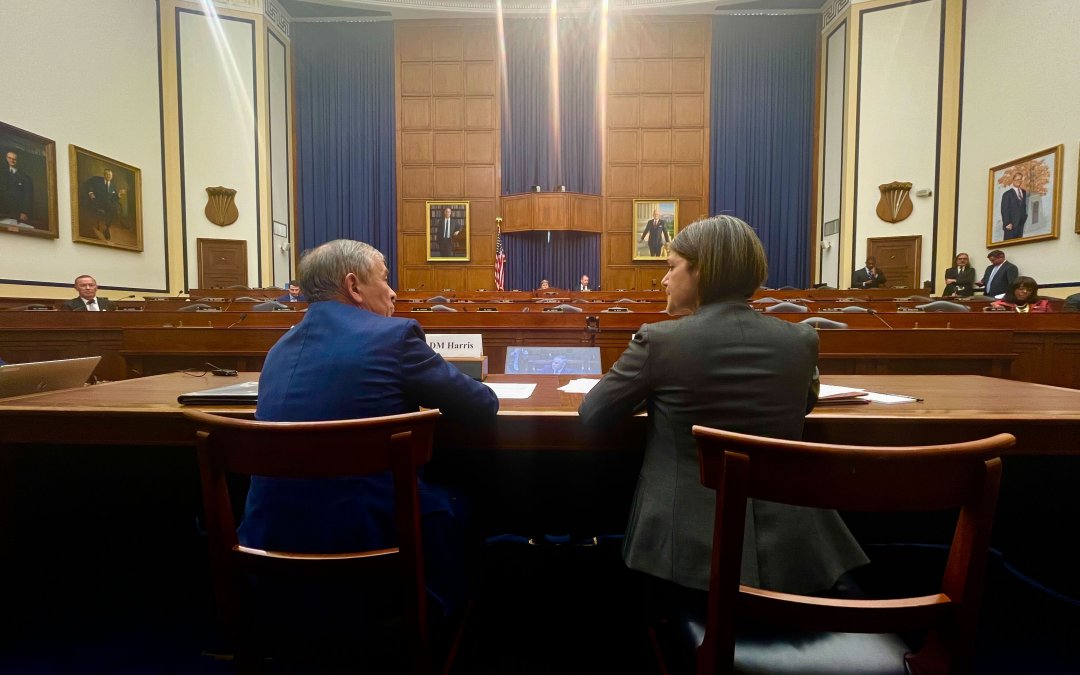WASHINGTON – The House Committee on Armed Services raised new worries about China’s threats to U.S. national defense and prospects for possible confrontation over Taiwan in the wake of the public’s attention over a suspected Chinese spy balloon that traversed the continental United States last week.
Throughout the hearing held Tuesday morning, Republicans took many opportunities to chastise the Biden administration over its response to the balloon, which has placed a renewed spotlight on U.S.-China relations. Several also raised questions about the U.S. government’s extensive aid to Ukraine.
Rep. Joe Wilson (R-S.C.) condemned Biden for shifting blame to the military for the decision not to shoot down the balloon sooner. Over the weekend, Biden told reporters that he gave orders on Wednesday to shoot the balloon down, but that his advisers recommended he wait until it was safe and debris would not hit civilians or buildings below.
“To me this is duplicity. The responsibility of not acting sooner is the sole responsibility of President Biden,” Wilson said.
The hearing is also part of a broader push by lawmakers, and Republicans in particular, to probe the wide-ranging threats posed by China. The House Financial Services Committee held a hearing Tuesday morning to assess the economic threats posed by China, and the Senate Foreign Relations Committee is poised to look into U.S.-China policy during a hearing scheduled for Thursday.
It also comes the same day that Biden will deliver his State of the Union address, where he is expected to continue making the case for continued support to Ukraine as Russia’s invasion nears the one-year mark.
While most experts do not see war with China as imminent, a U.S. Air Force general recently predicted that the U.S. could go to war with China as early as 2025, likely over Taiwan, which Beijing regards as part of China.
The witnesses pushed back on the idea posed by some Republicans that supporting Ukraine and Taiwan is mutually exclusive.
“I do believe that we need to do as much as we can for Ukraine, and we have the capacity to help Taiwan at the same time,” said retired Adm. Harry B. Harris Jr. “So it’s not binary, but we have to overcome policy on the Taiwan front, and not so much on the Ukraine front.”
Rep. Adam Smith (D-Wash.), the ranking member on the committee, said that war with China should not be treated as an inevitability.
“Our objective is to have a world where China and the U.S. can coexist peacefully,” Smith said. “I think it is a dangerous mistake if we think we are somehow going to ‘defeat’ China, whatever that might mean.”
Lawmakers from both parties questioned witnesses about what the U.S. could do to deter Chinese aggression toward Taiwan.
In his opening statements, Rep. Mike Rogers (R-Ala.), the committee’s chair, said that China is committing human rights abuses, taking destabilizing actions and outpacing the U.S. in both military and technological innovation.
While lawmakers from both parties agreed with the witnesses on the need to increase and expedite support for Taiwan, Rep. Andy Kim (D-N.J.) expressed concern over the possibility of the executive branch committing the U.S. to going to war to protect Taiwan without consent from Congress.
“I do want us to be very careful about what kind of red lines the executive branch can draw, especially when it’s something that brings the full force of the United States military potentially into action,” Kim said. “This is something that I think all of us would agree is the most sacred and important duty that this body can be engaged in, and we’re here to represent that voice of the American people.”
Harris and Melanie W. Sisson, a foreign policy fellow at the Brookings Institution, emphasized the importance of expediting efforts to share U.S. nuclear submarine technology with Australia in accordance with a partnership signed in 2021 known as AUKUS.
“I can’t emphasize enough how important it is to get through this export control issue with Australia,” Harris said. “We could have every good intention in the world, but we could be bound up by our own regulation and our own regulatory policy.”
Biden is expected to address U.S.-China relations in his second State of the Union message. White House Communications Director Kate Bedingfield told Lawrence O’Donnell on “The Last Word” on Monday night that the president will touch on “his approach to foreign policy, how he is asserting American leadership across the globe, and, of course, our relationship with China.”



